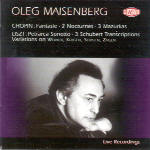American collectors probably know Oleg Maisenberg more as a chamber music pianist than as a soloist. This situation is dutifully remedied by Glissando in a five-CD set culled from Maisenberg’s Vienna Konzerthaus cycle of 12 recitals held during the 1994-95 season. Sonically speaking, these live recordings capture Maisenberg’s wide dynamic range to an ample degree. His tone, to be sure, holds little allure and turns brittle at loud moments. Maisenberg also grunts and hums a lot, but rarely to Glenn Gouldian levels of distraction.
Starting chronologically by composer, Maisenberg’s rapt, large-scaled conceptions of Mozart’s B minor Adagio and C minor Fantasia K. 475 rivet your attention, while the unpretentious (and seldom played) B-flat Allegro K. 400 is ideally crisp and nimble. Soft-grained contours and subtle variations in articulation characterize Maisenberg’s take on the Beethoven A major sonata Op. 2 No. 2, even if the pianist’s tone teeters between clipped constipation and ravishing quietude. Schubert’s C minor Impromptu gets a monumental, severe, and bleak reading, yet not without aching lyric beauty. At first Maisenberg relegates the G-flat Impromptu’s murmuring accompaniment to the background, but it steadily asserts itself without impeding the overall melodic flow.
Conversely, I find Maisenberg’s Chopin almost too studied and self-consciously detailed: canons buried in hothouse flowers, to paraphrase Schumann. But Maisenberg brilliantly plays Liszt’s spooky textural drama and rabid harmonic invention in the Weinen, Klagen, Sorgen, Zagen Variations, so much so that I’ll forgive Maisenberg’s flinty tone in the booming octaves. The Petrarca Sonetto 104 has its ardent moments, but the climaxes are not well planned and Maisenberg’s audible groaning sounds as if a porno movie is showing in the background. I also find Ravel’s Pavane and Miroirs similarly static and fussed over.
The collection’s all-Russian disc, however, offers a myriad of delights, starting with a really inspired and richly characterized performance of Tchaikovsky’s The Seasons. Maisenberg’s Scriabin is no less idiomatic, but for me his spacious, individually nuanced Debussy Book One Preludes, Estampes, Images Book Two, and Suite Bergamasque easily crown this collection. If Maisenberg’s sonority doesn’t match Debussy’s “piano without hammers” tonal ideal, instead we might imagine mallets of all shapes and dimensions. Of course, this release ultimately caters to a specific, specialized audience. Still, it’s gratifying to know that certain small labels are willing to bend over backward on behalf of sort-of-famous artists in whom they believe. Will it sell?
































